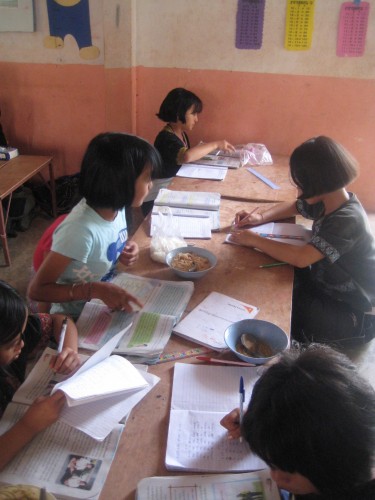Ever heard the phrase ‘two heads are better than one’? This can be especially true when it comes to studying in groups. If kids can play in groups and learn important qualities like teamwork, leadership and sportsmanship, why not study in groups and excel academically? In this article you’ll learn the advantages of group study and how to form an effective study group for your children.

The Benefits of Group Study
No more procrastination: When you procrastinate, you don’t let anyone down but yourself. However, when kids study in a group, they expect others to show up and contribute, and this in return causes them to set expectations for themselves. It also results in a better understanding of the subject and fulfills the purpose of the homework.
Clarify doubts: Kids who are struggling to understand a concept in the classroom and who are shy to ask their teachers, will find it easier to ask the same questions to their friends. The learning process is also sped up: when kids teach each other, not only do they help others understand, but also help themselves to internalise the subject matter.
New techniques and perspectives: When kids study in groups, they not only absorb knowledge from each other but also learn how to learn. In other words, group study allows the kids to absorb other students’ study techniques and strategies. They will also get to discover how the same problem could be approached in different ways.
Less monotony: Kids have a very short attention span, especially when it comes to sitting at their desk and studying solo. Group study can help them avoid the monotony and boredom that often accompany when they study alone. Infact if the study group is formed well, kids will look forward to it as much as they would look forward to their play time.
How to Form An Effective Study Group
Of course, group study has its downsides. Quite often, study groups can easily go off track and turn into an unproductive session. Someone cracks a joke, another starts drawing cartoons and in no time, the kids are far off from their initial task of studying.
Children learn by imitation and often compare their own progress with that of their peers – defined in KooBits research as Shadow Dynamics. The group may promote excellence, or it may agree on mediocrity. If the latter occurs, everyone follows suit, even though perhaps one of them strives to achieve excellence.
However, the downsides shouldn’t stop you from letting kids form groups to study. If the right balance is struck, group study can do wonders to your kid’s academic performance. Here’s where your role as a parent comes into picture: the points below will aid you in forming an effective study group for your kids.
Form the right group size. On an average about 4-5 kids in a group will make the study effective. The larger the group, the greater the chance that some kids will be left behind.
Have a right mix. See to it that the group has a proper mix of students who have strengths and weaknesses in various subjects. This allows the students to help and learn from one another so that at the end of the group study session, they will all be at the same level of understanding.
Schedule a routine. Ask the kids to set a regular time weekly or bi-weekly when they will meet for the group study and see to it that they are regular at it. One way to motivate the children is to suggest that they can play or do other activities together once they have finished studying.
Assign clear goals. Assign a goal for every session of group study that all the kids have to achieve, such as completing two chapters of Science. They can even try out experiments as a group, or role-play a story in the English textbook.
Ensuring productivity: A study group is effective if the meeting time is used responsibly. If your child is older, you may not want to supervise the group the entire time. However, you do not want to leave them completely unattended either. Perhaps with some snacks and drinks, you can check in on them once in a while to make sure they are not deviating from their task.
Group study, if conducted well, can be an excellent tool to improve your kid’s academic performance. Is your child part of a group study? How is it benefiting him, or does he face any problems with it?
at 3:33 PM
It’s superb tips for kids study.
Love it – thanks for the idea!!! appreciate the insights I gain from your writing.